基于 mykernel 2.0 编写一个操作系统内核
我使用的是Ubuntu 18.04 64位系统,用了VMware软件
1.用wget下 mykernel-2.0_for_linux-5.4.34.patch有点bug,所以直接用qq群里面的文件
用axel命令下载linux-5.4.34.tar.xz 特别慢,所以直接在Chrome
浏览器下好拖到虚拟机里面 
2.安装所需的库
用默认源下载特别慢,换了清华的源,下载库时又出现依赖不对的问题,发现换源之后要用sudo apt-get update 和sudo apt-get upgrade更新下就好了

3.patch
patch -p1 < ../mykernel/mykernel-2.0_for_linux-5.4.34.patch
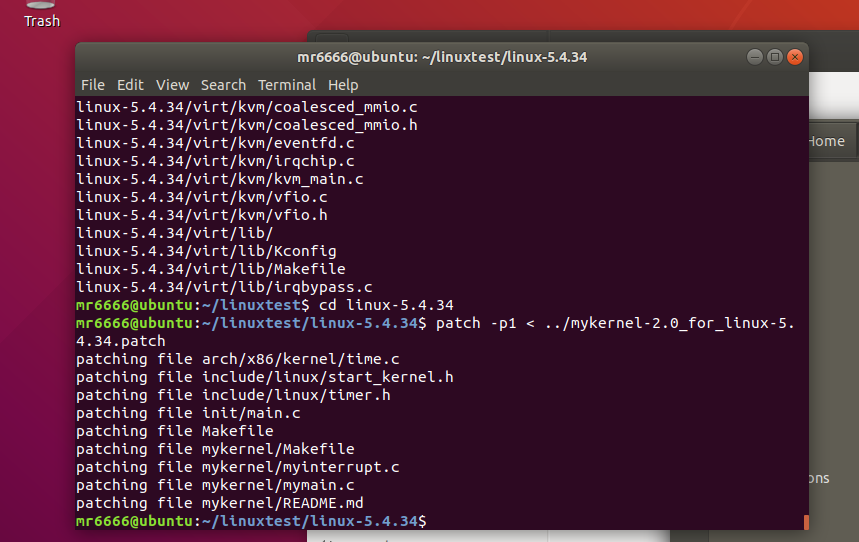
4.编译
make defconfig # Default configuration is based on 'x86_64_defconfig'
make -j$(nproc)
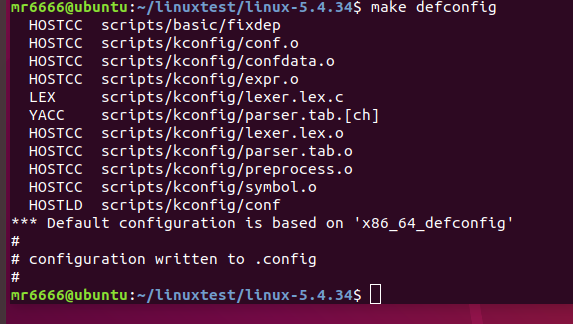
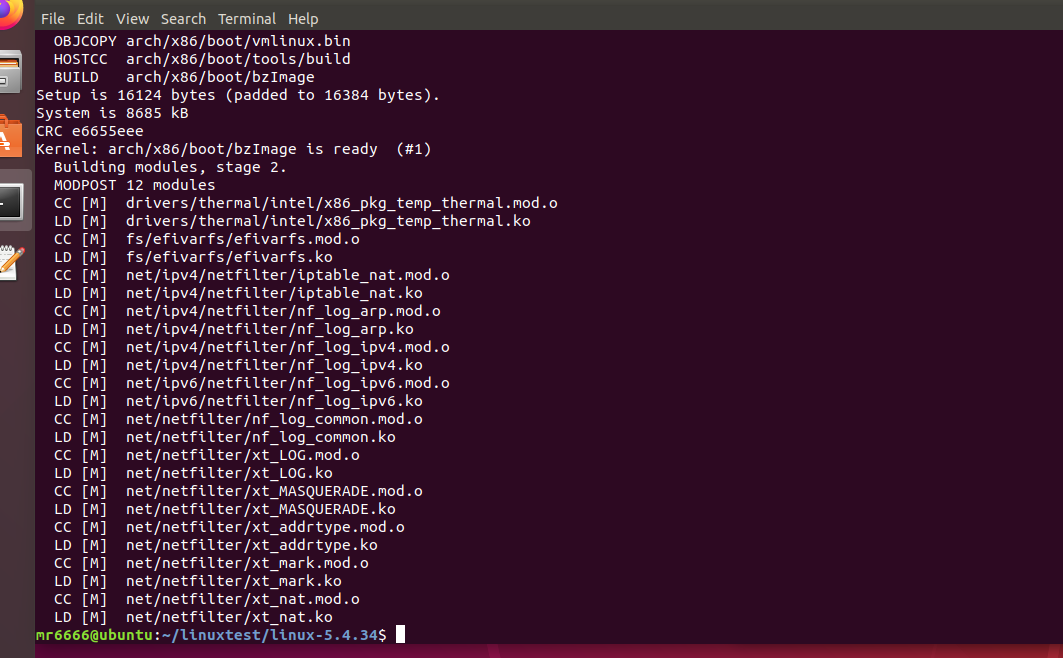
5.安装QEMU并运行


6.将myinterrupt.c,mymain.c,mypcb.h文件放入mykernel,重新编译下
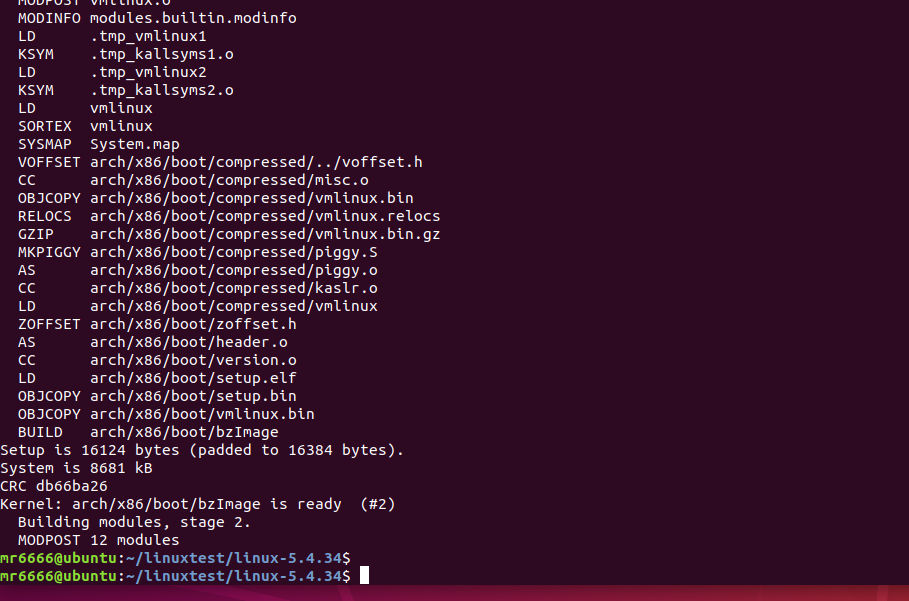
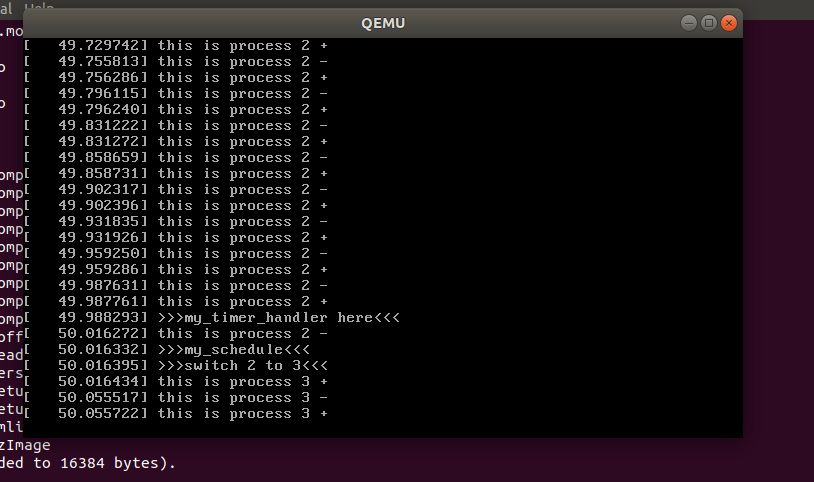
7.代码分析
*
* linux/mykernel/mypcb.h
*
* Kernel internal PCB types
*
* Copyright (C) 2013 Mengning
*
*/
#define MAX_TASK_NUM 4
#define KERNEL_STACK_SIZE 1024*2
/* CPU-specific state of this task */
struct Thread {
unsigned long ip;
unsigned long sp;
};
typedef struct PCB{
int pid;
volatile long state; /* -1 unrunnable, 0 runnable, >0 stopped */
unsigned long stack[KERNEL_STACK_SIZE]; //2kb大小的栈
/* CPU-specific state of this task */
struct Thread thread;
unsigned long task_entry;
struct PCB *next;
}tPCB;
void my_schedule(void); //调度函数
*
* linux/mykernel/mymain.c
*
* Kernel internal my_start_kernel
* Change IA32 to x86-64 arch, 2020/4/26
*
* Copyright (C) 2013, 2020 Mengning
*
*/
#include <linux/types.h>
#include <linux/string.h>
#include <linux/ctype.h>
#include <linux/tty.h>
#include <linux/vmalloc.h>
#include "mypcb.h"
tPCB task[MAX_TASK_NUM];
tPCB * my_current_task = NULL;
volatile int my_need_sched = 0;
void my_process(void);
void __init my_start_kernel(void)
{
int pid = 0;
int i;
/* Initialize process 0*/
task[pid].pid = pid;
task[pid].state = 0;/* -1 unrunnable, 0 runnable, >0 stopped */
task[pid].task_entry = task[pid].thread.ip = (unsigned long)my_process;
task[pid].thread.sp = (unsigned long)&task[pid].stack[KERNEL_STACK_SIZE-1];
task[pid].next = &task[pid];
/*fork more process */
for(i=1;i<MAX_TASK_NUM;i++)
{
memcpy(&task[i],&task[0],sizeof(tPCB));
task[i].pid = i;
task[i].thread.sp = (unsigned long)(&task[i].stack[KERNEL_STACK_SIZE-1]);
task[i].next = task[i-1].next;
task[i-1].next = &task[i];
}
/* start process 0 by task[0] */
pid = 0;
my_current_task = &task[pid];
asm volatile(
"movq %1,%%rsp\n\t" /* set task[pid].thread.sp to rsp */
"pushq %1\n\t" /* push rbp */
"pushq %0\n\t" /* push task[pid].thread.ip */
"ret\n\t" /* pop task[pid].thread.ip to rip */
:
: "c" (task[pid].thread.ip),"d" (task[pid].thread.sp) /* input c or d mean %ecx/%edx*/
);
}
int i = 0;
//进程执行的代码
void my_process(void)
{
while(1)
{
i++;
if(i%10000000 == 0)
{
printk(KERN_NOTICE "this is process %d -\n",my_current_task->pid);
if(my_need_sched == 1)
{
my_need_sched = 0;
my_schedule();
}
printk(KERN_NOTICE "this is process %d +\n",my_current_task->pid);
}
}
}
/*
* linux/mykernel/myinterrupt.c
*
* Kernel internal my_timer_handler
* Change IA32 to x86-64 arch, 2020/4/26
*
* Copyright (C) 2013, 2020 Mengning
*
*/
#include <linux/types.h>
#include <linux/string.h>
#include <linux/ctype.h>
#include <linux/tty.h>
#include <linux/vmalloc.h>
#include "mypcb.h"
extern tPCB task[MAX_TASK_NUM];
extern tPCB * my_current_task;
extern volatile int my_need_sched;
volatile int time_count = 0;
/*
* Called by timer interrupt.
* it runs in the name of current running process,
* so it use kernel stack of current running process
*/
void my_timer_handler(void)
{
if(time_count%1000 == 0 && my_need_sched != 1) //每过1000,将my_need_sched的值修改为1,模拟时间片到期
{
printk(KERN_NOTICE ">>>my_timer_handler here<<<\n");
my_need_sched = 1;
}
time_count ++ ;
return;
}
void my_schedule(void)
{
tPCB * next;
tPCB * prev;
if(my_current_task == NULL
|| my_current_task->next == NULL)
{
return;
}
printk(KERN_NOTICE ">>>my_schedule<<<\n");
/* schedule */
next = my_current_task->next; //下一个进程
prev = my_current_task;
if(next->state == 0)/* -1 unrunnable, 0 runnable, >0 stopped */
{
my_current_task = next;
printk(KERN_NOTICE ">>>switch %d to %d<<<\n",prev->pid,next->pid);
/* switch to next process */
asm volatile(
"pushq %%rbp\n\t" /* save rbp of prev */
"movq %%rsp,%0\n\t" /* save rsp of prev */
"movq %2,%%rsp\n\t" /* restore rsp of next */
"movq $1f,%1\n\t" /* save rip of prev */
"pushq %3\n\t"
"ret\n\t" /* restore rip of next */
"1:\t" /* next process start here */
"popq %%rbp\n\t"
: "=m" (prev->thread.sp),"=m" (prev->thread.ip)
: "m" (next->thread.sp),"m" (next->thread.ip)
);
}
return;
}


 浙公网安备 33010602011771号
浙公网安备 33010602011771号